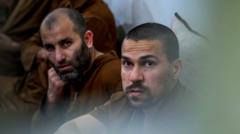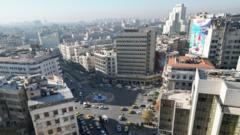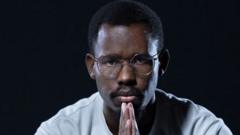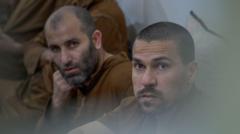The arrival of U.S. diplomats in Damascus marks a significant shift in American engagement in Syria, as the Biden administration seeks to foster political dialogue in a nation long plagued by conflict.
Diplomatic Efforts in Syria: U.S. Diplomats Seek to Engage with Militia Leaders

Diplomatic Efforts in Syria: U.S. Diplomats Seek to Engage with Militia Leaders
Three senior U.S. officials arrive in Syria to discuss potential governance and the fate of missing citizens, including journalist Austin Tice.
The renowned U.S. State Department made an announcement early Friday regarding the arrival of three senior American diplomats in Damascus, Syria. This visit represents the first engagement of U.S. officials in the capital since the collapse of the Syrian government under Bashar al-Assad, amidst ongoing civil turmoil that began with the 2011 uprising. The diplomats aim to explore the whereabouts of Austin Tice and other American citizens who have been reported missing.
The delegation consists of Barbara Leaf, assistant secretary of state for Near Eastern affairs; Roger D. Carstens, the special presidential envoy for hostage affairs; and Daniel Rubinstein, the new special adviser on Syria. As they proceed with their visit, they intend to meet with leaders of the dominant militias, such as Hayat Tahrir al-Sham, and assess the evolving political landscape in the region following recent upheavals leading to the Assad government's diminished power.
This diplomatic mission highlights a marked transition from previous U.S. military-focused involvements in Syria to a more dialogue-oriented approach, an effort that has gained momentum due to recent developments within the Syrian political fabric. The Biden administration has begun to establish connections with militia leaders, navigating a complex political terrain, particularly given the U.S.’s previous terrorist designations against factions like Hayat Tahrir al-Sham.
The State Department emphasized that the diplomats would engage with various sectors of Syrian society, aiming to listen to their perspectives on the future governance of the country. Addressing the need for inclusive governance that represents all ethnic and religious communities, particularly minorities like Christians, is a pivotal objective that U.S. officials want to communicate during their discussions.
Overall, the engagement of U.S. diplomats in Syria signals a potential shift toward a more cooperative and supportive role aimed at fostering peace and stability in a nation that has endured prolonged violence and unrest.
The delegation consists of Barbara Leaf, assistant secretary of state for Near Eastern affairs; Roger D. Carstens, the special presidential envoy for hostage affairs; and Daniel Rubinstein, the new special adviser on Syria. As they proceed with their visit, they intend to meet with leaders of the dominant militias, such as Hayat Tahrir al-Sham, and assess the evolving political landscape in the region following recent upheavals leading to the Assad government's diminished power.
This diplomatic mission highlights a marked transition from previous U.S. military-focused involvements in Syria to a more dialogue-oriented approach, an effort that has gained momentum due to recent developments within the Syrian political fabric. The Biden administration has begun to establish connections with militia leaders, navigating a complex political terrain, particularly given the U.S.’s previous terrorist designations against factions like Hayat Tahrir al-Sham.
The State Department emphasized that the diplomats would engage with various sectors of Syrian society, aiming to listen to their perspectives on the future governance of the country. Addressing the need for inclusive governance that represents all ethnic and religious communities, particularly minorities like Christians, is a pivotal objective that U.S. officials want to communicate during their discussions.
Overall, the engagement of U.S. diplomats in Syria signals a potential shift toward a more cooperative and supportive role aimed at fostering peace and stability in a nation that has endured prolonged violence and unrest.




















